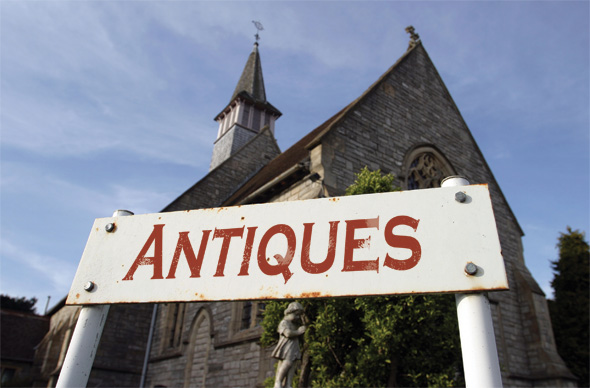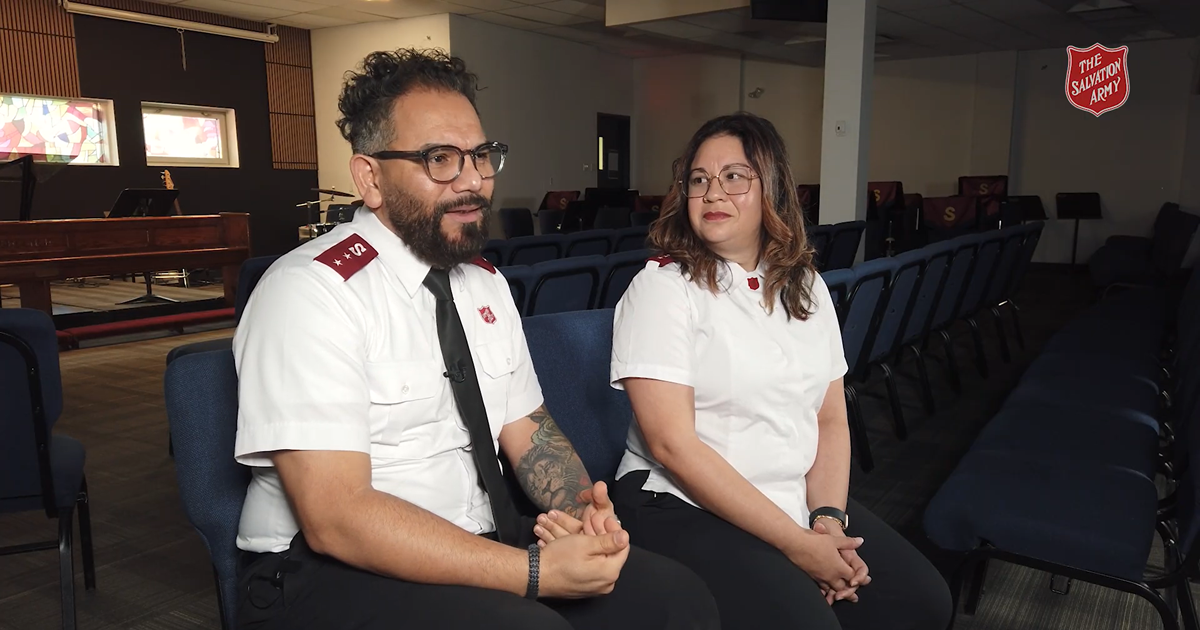 An-tique: 1. a relic or object of ancient times; 2. being in the style or fashion of former times.
An-tique: 1. a relic or object of ancient times; 2. being in the style or fashion of former times.
As I drove through the main street of a southern Ontario city, I saw ahead of me a large sign that read ANTIQUES. When I drew closer, I realized that it was attached to the front steps of an old brick church. A cross stood over the door and another on the roof. Stained-glass windows still invited the passersby.
Except for the sign, the church looked the same as it did when it was erected, more than a hundred years ago. The church itself is an antique. No one worships there anymore. The money changers have taken it over, selling old things to old people, nostalgic for things that were, but will never be again.
I thought of the Salvation Army churches I had visited over the past few months. Most of the worshippers were as old as the vintage items found in that little brick church. Some of us baby boomers even grew up with oil lamps, vacuum-tube radios and box cameras.
It begs the question: Has The Salvation Army become an antique, an organization in the style or fashion of former times?
I entered training college in the days when men wore high-collar uniforms and women wore buns and bonnets. In my second year of training, the principal decided that cadets did not need to wear that uncomfortable regalia in class, a radical move at the time. A few years later, the Army in Canada exchanged the high collars for lapel uniforms and the bonnets for hats. One would think from the reaction of some Salvationists that the sky had fallen in. But the young women officers were glad enough to burn their buns and so, too, were the young men to cast off their choking collars. Many of us younger folk saw these styles as outdated.
The clientele at antique stores are dedicated to their hobby and willing to pay top dollar for something they really like. But these vintage shops don't attract a fraction of the people who go to Wal-Mart, the movies or the local Tim Hortons. The same can be said of most churches, including those that belong to The Salvation Army. We have our clientele—people who are dedicated to attending Sunday morning worship and people who will pay top dollar to hear a brass band concert or choir. But those numbers pale in comparison to the numbers of people at the local mall on Sunday morning, a rock concert on Saturday night or at the local coffee shops on Wednesday evening.
In the eyes of many, the Church has become an antique. Those of us who attend just don't have the honesty to hang the sign on the front steps.
But the gospel is as fresh today as when Jesus first announced the good news on the hills of Galilee. It spoke to his generation and to every subsequent generation. And the postmodern generation is waiting to hear it. One of the problems is that we don't speak their language. We don't think like they think. Until we learn that, we will be stuck in antiquity.
Our Founder, William Booth, knew how to speak the language of his generation. That was a generation of progress that looked to the future, expecting it to get better. Booth capitalized on that and made plans for his Army to establish a heaven on earth and to win the world for Jesus. And they nearly did it.
But this is not a generation of progress. We have some technological advances in communication, but wars, natural disasters, terrorism and economic crises have all but destroyed any optimism this generation may have had. Few are expecting the immediate future to be better. The language and methods of Booth do not resonate today.
If we continue to use outmoded methods and language, we will be relegated to an antiques roadshow, attracting the nostalgic and the curious while the masses of humanity pass us by.
I am an antique. In my early days, I used to get invited to conduct youth rallies and run summer camps. Now I get asked to conduct seniors' Sundays. Thankfully antiques are not entirely useless. While they are not very practical, their most valuable quality is their ability to inspire. Take, for example, vintage cars. The oldest ones are very slow. The muscle cars of the 1960s are gas guzzlers and air polluters. But when put on display, polished and restored, they attract car enthusiasts who admire the cars' beauty and the ingenuity of those early designers.
Likewise, the antiques in the Church are most valuable when they inspire the younger generation to do more and be better than the previous generation. Do we have the courage to let the next generation have its turn?
Photo: Copyright © iStockphoto.com
 Major Fred Ash is the corps officer at Burlington Community Church, Ont.
Major Fred Ash is the corps officer at Burlington Community Church, Ont.









Comment
On Friday, November 19, 2010, Baxter Freake said:
On Tuesday, October 19, 2010, Len Ballantine said:
Len Ballantine . . . Yorkminster Citadel
On Tuesday, October 19, 2010, Peter said:
Thanks for the honesty and shame on us for the times where we have cared more about preserving traditions than we have about proclaiming the Gospel!
Fortunately for us though nothing about the gospel needs adaptation – it is us and our own cultures that we carry with us that need the adjustment in order to better convey the gospel to our world.
Bless you as you faithfully live this out in your community.
Peter
On Tuesday, October 19, 2010, Major/ Captain Patrick Lublink - Military Chaplain said:
Cheers
Pat
On Monday, October 18, 2010, Moe said:
Take Calgary for example, a city of over 1 million people, has only 3 corps with an total average of 450 people. The reality is these churches cannot function much longer if they do not reach the younger generation and let go of traditional boundaries.
On Monday, October 18, 2010, Dennis Dafoe said:
Appreciated.
Rev. Dennis Dafoe
Leave a Comment